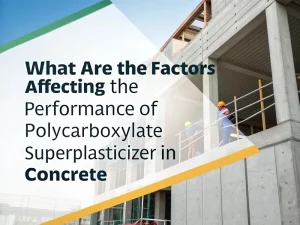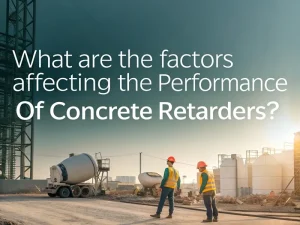
What are the factors affecting the performance of polycarboxylate superplasticizer in concrete?
Blog what are the factors
Blog
This article delves into the characteristics, working mechanisms, types, applications, and benefits of HRWR admixture, emphasizing their significance in the construction industry.
HRWR admixture, or superplasticizer, is a chemical additive added in small amounts to concrete. It can significantly reduce the water required in the mixture while maintaining or improving its workability.
Unlike traditional water-reducing agents, HRWR admixtures have a higher water-reducing ability, typically reducing water content by 25-40% or even more. They make concrete have a lower water-cement ratio while improving strength, durability, and fluidity.
Molecular Structure: Adsorption and Dispersion
The core component of HRWR is a polycarboxylate polymer, whose molecules have a “comb-like” structure:
The main chain carries a negative charge and adsorbs onto the surface of cement particles, generating electrostatic repulsion;
The long, flexible side chains form a steric hindrance to prevent particle aggregation.
This dual effect allows the cement particles to be evenly dispersed, releasing the encapsulated free water and reducing water consumption.
Dynamic control: Stir until hardened
Water locking technology: Some HRWR molecules will slowly hydrolyze during the initial stage of cement hydration, continuously releasing dispersing force and delaying slump loss (for example, in nuclear power engineering, slump fluctuation within 90 minutes must be ≤ 20mm).
Temperature adaptability: The new HRWR can automatically adjust the release rate according to the ambient temperature, accelerate dispersion at high temperatures, and delay reaction at low temperatures, ensuring construction stability.
Pushing concrete to very high heights is crucial in constructing high-rise buildings. HRWR admixtures, mainly PCE-based admixtures (PCE POWDER), are widely used in producing high-strength, high-workability concrete that can be easily pumped through long pipelines without segregation. The reduction of water cement ratio achieved by HRWR admixture ensures that the concrete has the strength to support the enormous loads of high-rise structures.
Bridges and large-scale infrastructure projects typically require high-performance and high-strength concrete, which can withstand heavy traffic loads, environmental pressures, and corrosive chemical erosion. HRWR admixtures enhance concrete strength, durability, and workability in these projects.
Prefabricated concrete with crucial early strength
Early-strength precast concrete relies on HRWR admixtures to produce high-quality precast components with precise shapes and sizes. Reducing moisture content while maintaining processability allows for producing lightweight prefabricated components, which is beneficial for transportation and installation.
HRWR admixture can also be used to produce self-compacting precast concrete, which can fill complex molds without vibration, shorten production time, and improve the surface smoothness of the product.
Advantage | Application scenarios | Case |
Ultra high water reduction rate | Prepare high-strength concrete above C80 | Dubai Burj Khalifa pumping to an altitude of 800m |
Precise liquidity control | Self compacting concrete | Pouring of complex structure of Shanghai center Building |
Durability improvement | Marine engineering, sulfate environment | Shantou Bay Tunnel |
energy saving and environmental protection | Reduce cement usage by 20% -30% | Green Building LEED Certification Project |
With the increasing demand for extreme environments such as super high-rise buildings, deep-sea engineering, and lunar bases, HRWR admixtures play an irreplaceable role in the concrete industry. We should continue to pay attention to and develop more functional additives to adapt to the development of the new era.

What are the factors affecting the performance of polycarboxylate superplasticizer in concrete?
Blog what are the factors

What are the factors affecting the performance of concrete retarders?
Blog What are the factors

What admixtures are compatible with polycarboxylate superplasticizer?
Blog What admixtures are